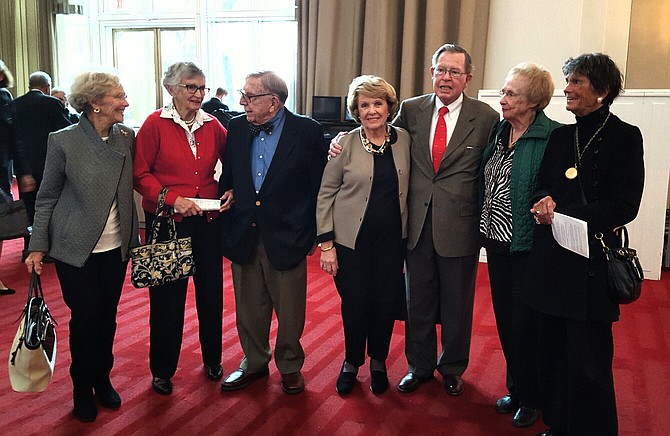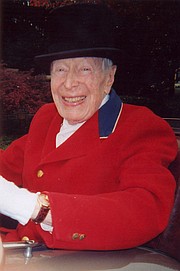Among the nearly thousand friends and family members who attended “A Celebration of the Life of Austin H. Kiplinger” at the Kennedy Center Concert Hall, was a group of his Potomac friends, (from left) Susan Moran, Lutie Semmes, Roemer McPhee, Lorrie Plamondon, Pete Plamondon, Sue Monahan and Joan McPhee. Photo by Dave Phillips
“He valued people for their character, not their status, and raised his children and grandchildren to do the same.”
— from the pamphlet, “A Celebration of the Life of Austin H. Kiplinger”
There were very few empty seats left in the Kennedy Center’s spacious Concert Hall on Dec. 11, where nearly a thousand family members and friends gathered to celebrate the life of Austin Huntington “Kip” Kiplinger who died Nov. 20 following a brief bout with brain cancer.
Knight Kiplinger, Kip’s son, was master of ceremonies during the nearly two-hour program, introducing featured speakers, musical talent and a synopsis of his Dad’s achievements throughout his 97 years.
It has been only in the last few weeks that “Kip” was not contributing to one or another benefit, or driving to his Washington office from his home. It was, in fact, less than three weeks from his date of death when he appeared in the Potomac Day Parade, waving cheerfully to crowds gathered along the River Road parade route. It was then that his son, Knight, gravely admitted, “Dad is not well,” as he helped him climb into the rumble seat of a 1931 Model T Ford.
Major newspapers in the country have reported his death and accomplishments — editor in chief of “The Kiplinger Letters” and the Kiplinger personal finance magazine “Changing Times.” He co-authored several books with his father, the late W.M. Kiplinger, with son, Knight, and also on his own, including his 1973 “The How Not To Book of Country Life” in which he advised, “The time to buy a farm is when you can NOT afford it.” He reasoned if you wait, the price will rise and you still can’t afford it, only now you can’t for more money. “You might just as well buy it at a lower price. That way, you won’t be out so much money.”
Kiplinger’s wit is carried throughout this book, along with his two “Letter From Washington” books, the first in 2011, the second “Letter From Washington Part II.” Both are factual, informative and sprinkled with his humor and personal touch.
Austin Kiplinger started his career following his 1939 graduation from Cornell University, first as a reporter, followed by radio and television careers prior to his nearly 30 years with the Kiplinger publishing company. Although his professional career has been reported nationwide, what has not been told in depth was the deep love and respect he had and showed for his fellow man.
A portion of “A Celebration of the Life of Austin H. Kiplinger,” a pamphlet given to all attending the ceremony on Dec. 11, stated, “He enjoyed the company of people from all walks of life and varied backgrounds. His warm smile and genuine interest in their lives put put them at ease. He talked as easily with cab drivers, clerks, junior staffers, janitors, and construction workers as he did with Presidents, senators and CEOs. He valued people for their character, not their status, and raised his children and grandchildren to do the same.”
The National Symphony Orchestra Brass opened the 1 p.m. celebration with Aaron Copland’s “Fanfare for the Common Man,” a rousing presentation that could possibly have been heard as far away as The White House. It was followed by remarks from NSO’s former president Michael Brewer; Janet H. Brown, executive director, Commission on Presidential Debates; Kevin McCormally, SVP/Chief Content Officer, Kiplinger publishing; Frank H.T. Rhodes, Cornell president from 1977-1995; Leslie Buhler, executive director of Tudor Place and last, but far from least, Daphne Kiplinger, who represented Austin’s six grandchildren. When she finished her talk she quietly went around behind the VIP section and joined the chorus on stage.
Speeches were interspersed with choral selections delivered by members of The Washington Chorus and the Cornell Glee Club, the latter performing Cornell’s Evening Song, “Tannenbaum,” directed by Scott Tucker, former Cornell’s Glee Club and Chorus director. The Cornell students men’s chorus sang a capella. At the conclusion, dead silence followed until Knight Kiplinger, at the lectern, paused before uttering an emphatic “Wow!” The audience could no longer constrain a polite applause. It was crescendo.
No report on Kip’s life could be complete without mention of his many contributions to civic and educational projects giving his leadership talent to Cornell University, National Symphony Orchestra, National Press Club, Tudor Place, Washington International Horse Show, Potomac Hunt Club, Historical Society of Washington and numerous others. His name wasn’t just included on a roster. If he was involved, he gave it his all. He was also a member of the Metropolitan Club, Chevy Chase Club, Alfalfa Club, Alibi Club and the Society of Professional Journalists.
He dearly loved the country life he lived at Montevideo, the historic home on River Road where he and his late wife, Gogo, and their sons Knight and his late brother, Todd, lived for nearly 60 years. However, his interests were clearly expressed in the Celebration program by saying he “lived a life devoted to the people and passions he held most dear.” It included family, friends, colleagues at the office, fairness in human relations, civic engagement, the craft of journalism, Cornell University, history, his Navy Service in World War II, classical music — symphonic and choral, horses and open countryside in northwestern Montgomery County. Of the latter there is no mistaking he was referring to Montevideo and its surrounding woods and fields.
In addition to his son, Knight, and Knight’s wife, Ann, of Washington, he is survived by a daughter-in-law Dana Stifel Kiplinger of Weston, Conn., six grandchildren, seven great grandchildren and his companion of eight years, Bonnie Barker Nicholson of Bethesda.

